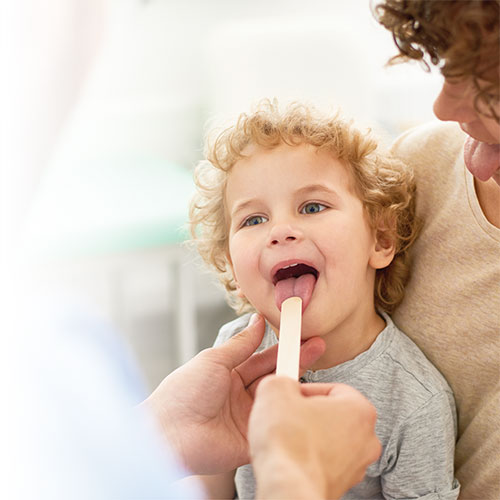Its name says it all—hand-foot-mouth disease is a rather common, yet relatively unknown early childhood infection. What do you know about the disease?
What is hand-foot-mouth disease?
This viral infection, commonly called hand-foot-mouth disease, is mainly caused by the Coxsachievirus type A16. It mostly affects young children, but can also occur at any age. The disease is more frequent in summer and in fall. Once the infection has healed, the patient is considered immunized (protected) against the virus.
Hand-foot-mouth disease is very contagious. It can be transmitted by contact with droplets from contaminated secretions (e.g., saliva or nasal secretions) with a lesion or an object contaminated by saliva or the secretions or feces of an infected person. The virus can remain in feces for several weeks after the infection.
Symptoms generally appear three to six days after the virus was contracted. The illness lasts for about 7 to 10 days, sometimes less. An infected person is contagious during the period of the infection but, as mentioned above, the virus can survive in feces for several weeks after the infection.
What are the signs and symptoms of hand-foot-mouth disease?
The nature and intensity of symptoms vary from one case to another. In some people, the infection will go unnoticed. Typical signs and symptoms include:
- sore throat
- fever
- headache
- cough
- runny nose
- painful mouth ulcers
- rash on the palms of the hands and the soles of the feet
The rash can appear on other areas of the body such as the buttocks and genitals. Typical manifestations include small red spots with blistering. It may be sensitive to the touch, but does not cause itching, as opposed to other infectious childhood diseases.
How can symptoms of hand-foot-mouth disease be relieved?
There is no cure for hand-foot-mouth disease. The infection must follow its course. However, some measures can be taken to relieve symptoms. Here are some examples:
- Give plenty of fluids.
- Ensure that your child gets adequate sleep and rest.
- If mouth ulcers appear, give cold and soothing fluids. Avoid fluids and foods that may irritate the mouth and increase discomfort.
- Use acetaminophen or ibuprofen to relieve pain and fever. Always ask your pharmacist for the dose of the medication to administer, according to the child's age and weight.
Pharmacists can advise you about the measures to take to relieve your little one's symptoms. They can give you advice if you must purchase an over-the-counter product. In some cases, prescription medication is necessary to relieve pain. As a medication expert, your pharmacist is the best suited person to provide information and advice about medication.
What are the complications of hand-foot-mouth disease?
Although this viral infection is harmless, it can be more serious for some people and cause complications. It may be difficult to nourish your child and keep him/her hydrated due to mouth ulcers. Thus, it is important to watch for any signs and symptoms of dehydration. A medical visit is necessary in some situations, for instance if your child:
- urinates less frequently
- has dry skin, a dry mouth, and tongue
- no longer has tears when he/she cries
- vomits often
- breathes rapidly
- suffers from a severe sore throat
- has a headache and neck stiffness
- is sleepier than usual or is confused
In rare cases where this infection causes complications, they may, for instance, be of a neurological or respiratory nature.
Individuals with a weakened immune system and pregnant women should see a doctor. This also applies if any unexpected or alarming symptoms are observed. Regardless of the situation, if you have any questions, don't hesitate to speak to your pharmacist, who can guide you to the appropriate resources.
How can hand-foot-mouth disease be prevented?
Contrary to several early childhood diseases, there is no vaccine against hand-foot-mouth disease. However, here are some measures that can be taken to protect against this infection:
- Infected individuals and those in contact with an infected person must wash their hands regularly. For instance, after having gone to the bathroom, after changing a diaper, before eating, after blowing one's nose, etc.
- Wash and disinfect all objects having been in contact with the secretions or feces of an infected person.
- Avoid all contact with an infected person.
Speak to your pharmacist for additional information about hand-foot-mouth disease.

